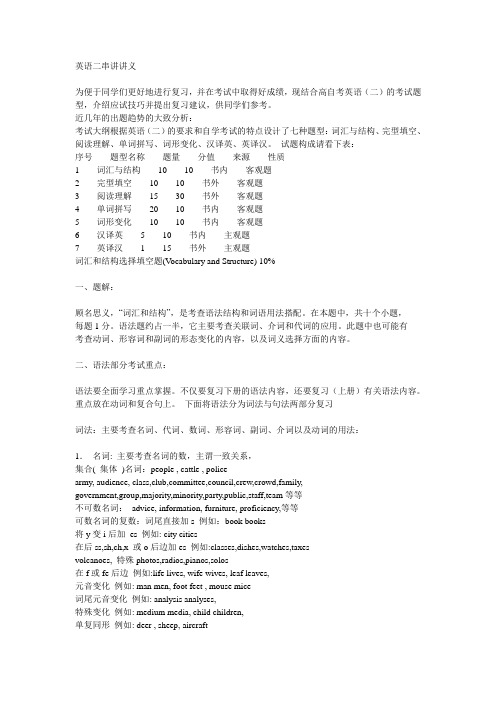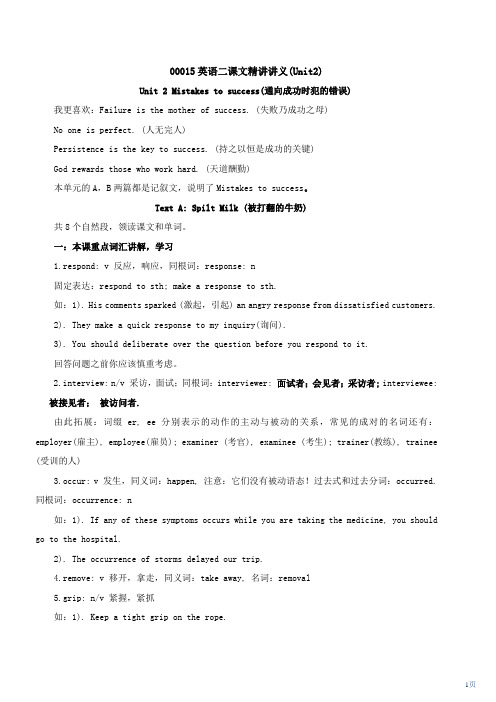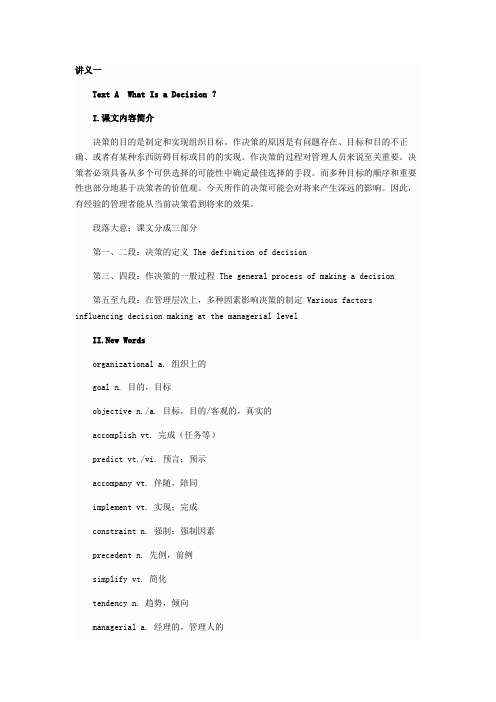考研英语(二)家教讲义(2)
英语二重点班讲义

英语二重点班讲义完整版讲义---华夏大地自考高伟老师主讲,真的很MAN!!第一单元知识点的回顾Text A1.choose----choice:词型转换经常考,同时注意该词的过去式和过去完成式。
2.★available:这个词考的频率很高。
换句话说,如果在答案中出现了该词,从词义上应该给予其优先考虑。
这个词出现的句子中经常会同时出现ticket, food, book等。
3.decide----decision,注意词性上的变化。
4.purpose:这个词一旦出现,它既可以考本词的意思,也可以考后面的谓语动词的形式,记住:凡是出现purpose, aim, objective, plan,dream, goal等有含有目的性的词,后面的谓语动词一定是to do的形式,同时关注这些词是否为复数形式,如果是,谓语动词一定是复数的。
5.achieve----achievement,注意词型上转换。
6.★in the way:妨碍,挡路,阻碍。
区别in a way:从某种程度上。
★on theway (to)在去…路上(★on the way home)和by the way:顺便说一句。
7.★★involve----involvement(in):注意词型转换,词义及介词搭配。
8.★consider----consideration。
注意词型上的转换,同时牢记take intoconsideration(account),如果单独考本词,后面的动词一定是+ing形式(动名词),但注意主动和被动含义上的区别。
9.make a guess at:注意固定习语的搭配。
10.certain----certainly----★certainty----★★uncertainty:注意词性和词义上的转换。
11.risk:注意后面接ing的动名词形式。
12. sometimes…;at other times…:注意前后句型上的搭配,很有可能在完型里考。
【免费下载】考研英语二强化 写作张洪磊讲义

考研英语(二)写作强化班讲义主讲老师: 张洪磊(Riky)2. FAQ (Frequently Asked Questions)(1)Should our writing be thoughtful and creative?Language / Structure/ Content(2) Is it possible for green hand to get an impressive score?Conditionally, YES!(3) Would writing template work?NO WAY!(4) Can I count on the subject prediction for writing?NO ZUO NO DIE.3. Requirements for Letter and Essay.(1)Letter考生根据所给情节写出一篇约100词(标点符号不计算在内)的应用性短文,包括私人和公务信函、备忘录、报告等。
共10分。
Writing Part A ( 2010 )Directions: You have just come back from the U. S. as a member of a Sino-American cultural exchange program. Write a letter to your American colleague to1) express your thanks for his/her warm reception;2) welcome him/her to visit China in due course.You should write about 100 words on ANSWER SHEET 2.Do not sign 'your own name at the end of the letter. Use "Zhang Wei" instead.Do not write your address. ( 10 points)(2) Essay考生根据提示信息写出一篇150单词左右(标点符号不计算在内)的短文。
【优质】英语二串讲讲义

第二部分:各题型详解以大纲样题和三套自测题为例讲解第一部分:阅读判断(第1~10题,每题1分,共10分)下面的短文后列出了10个句子,请根据短文的内容对每个句子作出判断:如果该句提供的是正确信息,选择A;如果该句提供的是错误信息,选择B;如果该句的信息文中没有提及,选择C,并在答题卡相应位置上将答案选项涂黑。
Passage 1 (选自大纲样题)When We Are Asleep①Everyone dreams, but some people never recall their dreams, or do so very rarely. Other people always wake up with vivid recollections(回忆)of their dreams, though they forget them very quickly. In an average night of eight hours’ sleep, an average adult will dream for around one hundred minutes, probably having three to five dreams, each lasting from ten to thirty minutes.②Scientists can detect when someone is having a dream by using an instrument which measures the electrical waves in the brain. During dreaming, these waves move more quickly. Breathing and pulse rate also increase, and there are rapid eye movements under the eye lids, just as though the dreamer were really looking at some moving objects. These signs of dreaming have been detected in all mammals studied, including dogs, monkeys, cats, and elephants, and also some birds and reptiles(爬行动物). This period of sleep is called the “D” state. Babies experience the “D” state for around 50% of their sleep; the period reduces to around 25% by the age of 10.③Dreams take the form of stories, but they may be strange and with incidents not closely connected, which make little sense. Dreams are seldom without people in them and they are usually about people we know. One estimate says that two-thirds of the “cast” of our dream dramas are friends and re lations. Vision seems an essential part of dreams, except for people blind from birth. Sound and touch are senses also often aroused, but smell and taste are not frequently involved. In “normal” dreams, the dreamer may be taking part, or be only an observe r. But he or she cannot control what happens in the dream.④However, the dreamer does have control over one type of dream. This type of dream is called a “l ucid” (清醒的) dream. Not everyone is a lucid dreamer. Some people are occasional lucid dreamers. Others can dream lucidly more or less all the time. In a lucid dream, the dreamer knows that he is dreaming.1.Some people dream but cannot remember their dreams.A. TrueB. FalseC. Not Given【答案】A【解析】根据第一段的第一句话Everyone dreams, but some people never recall their dreams, or do so very rarely.可知,该说法正确。
英语二串讲讲义

英语二串讲讲义为便于同学们更好地进行复习,并在考试中取得好成绩,现结合高自考英语(二)的考试题型,介绍应试技巧并提出复习建议,供同学们参考。
近几年的出题趋势的大致分析:考试大纲根据英语(二)的要求和自学考试的特点设计了七种题型:词汇与结构、完型填空、阅读理解、单词拼写、词形变化、汉译英、英译汉。
试题构成请看下表:序号题型名称题量分值来源性质词汇与结构书内客观题完型填空书外客观题阅读理解书外客观题单词拼写书内客观题词形变化书内客观题汉译英书内主观题英译汉书外主观题词汇和结构选择填空题(Vocabulary and Structure) 10%一、题解:顾名思义,“词汇和结构”,是考查语法结构和词语用法搭配。
在本题中,共十个小题,每题1分。
语法题约占一半,它主要考查关联词、介词和代词的应用。
此题中也可能有考查动词、形容词和副词的形态变化的内容,以及词义选择方面的内容。
二、语法部分考试重点:语法要全面学习重点掌握。
不仅要复习下册的语法内容,还要复习(上册)有关语法内容。
重点放在动词和复合句上。
下面将语法分为词法与句法两部分复习词法:主要考查名词、代词、数词、形容词、副词、介词以及动词的用法:1.名词: 主要考查名词的数,主谓一致关系,集合( 集体)名词:people , cattle , policearmy, audience, class,club,committee,council,crew,crowd,family,government,group,majority,minority,party,public,staff,team等等不可数名词:advice, information, furniture, proficiency,等等可数名词的复数:词尾直接加s 例如:book books将y变i后加es 例如: city cities在后ss,sh,ch,x 或o后边加es 例如:classes,dishes,watches,taxesvolcanoes, 特殊photos,radios,pianos,solos在f或fe后边例如:life lives, wife wives, leaf leaves,元音变化例如: man men, foot feet , mouse mice词尾元音变化例如: analysis analyses,特殊变化例如: medium media, child children,单复同形例如: deer , sheep, aircraft形为复数,实为单数例如: the United States ,the Philippinesnews, series,physics,ethics,只有复数形式例如: pincers , scissors, trousers , compasses2.代词:除了引出定语从句的关系代词外,比较重要的是一些不定代词,例如all, every, each, both, one, none, many, some, any, no, 以及either…or,neither…nor 搭配; few, a few , little , a little 的区别;other, another, the other, others , 的区别;other 指另外的人或物;others 泛指别人,可与some 连用;the other 指两个中的另一个,常和one 连用;the others 表示其余所有的人或物;another 则泛指另一个。
2020年老蒋英语二讲义

2020年老蒋英语二讲义One of the key aspects of the 2020 Lao Jiang English Lecture Notes is its comprehensive approach to language learning. The notes provide detailed explanations of grammar rules, accompanied by numerous examples and exercises to reinforce learning. This approach helps students understand the nuances of the English language and apply their knowledge in practical contexts. Additionally, the lecture notes include vocabulary lists and exercises to expand students' word banks and improve their ability to express themselves effectively.In addition to grammar and vocabulary, the lecture notes also focus on listening and speaking skills. The materials include audio resources that allow students to practice their listening comprehension and pronunciation. By engaging with authentic spoken English, students can improve their ability to understand different accents and intonation patterns. Moreover, the lecture notes provide speaking exercises that encourage students to practiceexpressing their ideas and opinions in English, thereby enhancing their communication skills.Furthermore, the 2020 Lao Jiang English Lecture Notes emphasize the importance of reading comprehension. The materials feature a variety of reading passages, including articles, essays, and stories, which are accompanied by comprehension questions and activities. Through these exercises, students can enhance their reading skills, such as skimming, scanning, and inferring meaning from context. Additionally, the reading materials expose students to different writing styles and genres, broadening their understanding of the English language.Another valuable aspect of the 2020 Lao Jiang English Lecture Notes is their practical relevance. The materials incorporate real-life scenarios and topics that are of interest to Chinese learners, making the learning experience more engaging and meaningful. By addressing relevant themes, such as travel, technology, and culture, the lecture notes help students connect language learning to their daily lives and interests, motivating them tocontinue improving their English proficiency.Moreover, the 2020 Lao Jiang English Lecture Notes are designed to be user-friendly and accessible. The materials are organized in a clear and logical manner, making it easy for students to navigate through the content. Additionally, the lecture notes include answer keys and explanations for the exercises, allowing students to check their own work and learn from their mistakes. This self-study aspect empowers students to take ownership of their learning and progress at their own pace.In conclusion, the 2020 Lao Jiang English Lecture Notes play a crucial role in supporting English language learning in China. The comprehensive approach, practical relevance, and user-friendly design of the materials make them a valuable resource for students seeking to improve their English proficiency. By addressing various language skills and incorporating real-life contexts, the lecture notes contribute to a well-rounded and engaging learning experience for Chinese learners. As English continues to be an essential skill in today's globalized world, resourceslike the 2020 Lao Jiang English Lecture Notes are instrumental in equipping students with the language abilities they need to succeed.。
00015英语二(2012版)讲义第02章

Unit 2 Mistake to SuccessA Famous QuoteSuccess is going from failure to failure without losing your enthusiasm.——Winston Churchill成功就是经历一次一次失败后,热情依旧。
——温斯顿・丘吉尔TEXT A Spilt Milkcry over spilt milk express regret for sth. that has happened and cannot be remedied 为已经发生而无法补救的事懊悔New Wordsspill v.(especially of liquid) to flow over the edge of the container by accident (使)洒出,泼出,溢出respond v. to do something as a reaction to something that somebody has said or done 作出反应,响应interview v. to ask somebody questions about their life, opinions, etc., especially on the radio ortelevision for a newspaper or magazine (媒体)采访;访问creative adj. involving the use of skill and the imagination to produce something new or a work of art创造(性)的;创作的occur v. to happen 发生;出现remove v. to take something or somebody away from a place 移开;拿开;去掉refrigerator n. a piece of electrical equipment in which food is kept cold so that it stays fresh 冰箱grip n. an act, of holding somebody/something tightly 紧握;紧抓slippery adj. difficult to hold or to stand or move on, because it is smooth, wet or polished 滑的;滑的抓不住(或站不稳,难以行走)的content n. the things that are contained in something 所容纳之物;所含之物veritable adj. a word used to emphasize that somebody/something can be compared to somebody/ something else that is more exciting, more impressive, etc. 十足的;名副其实的;不折不扣的yell v. to shout loudly, for example, because you are angry, excited, frightened or in pain 喊;大喊;吼叫lecture n. a long angry talk that somebody gives to one person or a group of people because they havedone something wrong(冗长的)教训,训斥,谴责mess n. a dirty or untidy state 肮脏;杂乱;不整洁rarely adv. not very often 罕有;很少;不常puddle n. a small amount of water or other liquid, especially rain, that has collected in one placeon the ground 水洼;小水坑eventually adv. at the end of a period of time or a series of events 最后;终于restore v. to bring somebody/something back to a former condition, place or position 使复原;使复位,使复职sponge n. a piece of artificial or natural material that is soft and light and full of holes and canhold water easily, used for washing or cleaning 海绵块effectively adv. in a way that produces the intended result or a successful result 有效的tiny adj. very small in size or amount 极小的;微小的discover v. to find out about something or information about something 了解到;认识到;查明grasp v. to take a firm hold of somebody/ something 抓紧;抓牢lip n. the edge of a container or a hollow place in the ground (容器或凹陷地方的)边,边沿renowned adj. famous and respected 有名的;闻名的;受尊敬的remark v. to say or write a commend about something/somebody 谈论;评论opportunity n. a time when a particular situation makes it possible to do or achieve something 机会;时机scientific adj. connected with science 科学(上)的;关于科学的valuable adj. very usefu1 很有用的;很重要的;宝贵的Phrases and Expressionsin this manner in the way which something is done or happens 用这种方式set ,apart from to make somebody/ something different from or better than others 区别;使与众不同重点词汇讲解spill v.(especially of liquid) to flow over the edge of the container by accident (使)洒出,泼出,溢出eg: The ink spilt all over the desk. 墨水洒了一桌子。
00015英语二课文精讲讲义(2)

00015英语二课文精讲讲义(Unit2)Unit 2 Mistakes to success(通向成功时犯的错误)我更喜欢:Failure is the mother of success. (失败乃成功之母)No one is perfect. (人无完人)Persistence is the key to success. (持之以恒是成功的关键)God rewards those who work hard. (天道酬勤)本单元的A,B两篇都是记叙文,说明了Mistakes to success。
Text A: Spilt Milk (被打翻的牛奶)共8个自然段,领读课文和单词。
一:本课重点词汇讲解,学习1.respond: v 反应,响应,同根词:response: n固定表达:respond to sth; make a response to sth.如:1). His comments sparked (激起,引起) an angry response from dissatisfied customers.2). They make a quick response to my inquiry(询问).3). You should deliberate over the question before you respond to it.回答问题之前你应该慎重考虑。
2.interview: n/v 采访,面试;同根词:interviewer: 面试者;会见者;采访者; interviewee:被接见者;被访问者.由此拓展:词缀er, ee分别表示的动作的主动与被动的关系,常见的成对的名词还有:employer(雇主), employee(雇员); examiner (考官), examinee (考生); trainer(教练), trainee (受训的人)3.occur: v 发生,同义词:happen, 注意:它们没有被动语态!过去式和过去分词:occurred. 同根词:occurrence: n如:1). If any of these symptoms occurs while you are taking the medicine, you should go to the hospital.2). The occurrence of storms delayed our trip.4.remove: v 移开,拿走,同义词:take away, 名词:removal5.grip: n/v 紧握,紧抓如:1). Keep a tight grip on the rope.2). She gripped the rope.6.veritable: adj 名符其实的,十足的如:1)It is a veritable heaven on earth.2)It was a veritable feast.7.yell: v叫喊,叫喊着说 n.叫喊,大声叫;(拉拉队员的)呼喊声Yell out: 喊出;yell at sb: 对某人喊叫如:1). Are you coming or not?' they yelled out after him.2). How can you yell at an old man like that?8.mess: n 肮脏,杂乱如:The room was in a mess .9.rarely: adv (= seldom)很少,不常,同根词:rare: adj如:1). The museum is full of rare and precious treasures.2). She is rarely seen in public nowadays.10.eventually: adv(= finally, at last)最终,终于eventually和finally在具体运用时有些区别:表示某事几经延迟或波折后最终发生,可以用eventually。
英语二完整讲义

讲义一Text A What Is a Decision ?I.课文内容简介决策的目的是制定和实现组织目标。
作决策的原因是有问题存在、目标和目的不正确、或者有某种东西防碍目标或目的的实现。
作决策的过程对管理人员来说至关重要。
决策者必须具备从多个可供选择的可能性中确定最佳选择的手段。
而多种目标的顺序和重要性也部分地基于决策者的价值观。
今天所作的决策可能会对将来产生深远的影响。
因此,有经验的管理者能从当前决策看到将来的效果。
段落大意:课文分成三部分第一、二段:决策的定义 The definition of decision第三、四段:作决策的一般过程 The general process of making a decision第五至九段:在管理层次上,多种因素影响决策的制定 Various factors influencing decision making at the managerial levelII.New Wordsorganizational a. 组织上的goal n. 目的,目标objective n./a. 目标,目的/客观的,真实的accomplish vt. 完成(任务等)predict vt./vi. 预言;预示accompany vt. 伴随,陪同implement vt. 实现;完成constraint n. 强制;强制因素precedent n. 先例,前例simplify vt. 简化tendency n. 趋势,倾向managerial a. 经理的,管理人的maker n. 制造者;制造商achievement n. 完成,达到attain vt. 达到;完成optimal a. 最适宜的,最理想的suboptimization n. 局部最优化trade-off n. 权衡;物物交换argue vt./vi. 争辩,争论budget n./vt. 预算scheme n./vt.把… 编入预算define vt. 解释,给…下定义multiple a./n.多样的,复合的/倍数profitability n. 赚钱,获利correctness n. 正确,正确性unintended a. 非计划中的,非故意的ongoing a. 进行中的,非故意的entity n. 存在,实体skilled a. 熟练的;有技能的in the way 挡路、碍事to make a guess at 猜测and the like 等等,诸如此类to seek to 追求,争取in part 部分地,在某种程度上point of view 观点词汇精讲1.goal n. 目标,进球,球门(同义词:aim ,end , purpose,objective)Her goal is a place at university . 她的目标是在大学任教。
- 1、下载文档前请自行甄别文档内容的完整性,平台不提供额外的编辑、内容补充、找答案等附加服务。
- 2、"仅部分预览"的文档,不可在线预览部分如存在完整性等问题,可反馈申请退款(可完整预览的文档不适用该条件!)。
- 3、如文档侵犯您的权益,请联系客服反馈,我们会尽快为您处理(人工客服工作时间:9:00-18:30)。
第二次课的讲义重视单词,复习语法!一、复习语法1、复述五种基本句型(1)及物动词/不及物动词(2)第四句型与第五句型的区别,间接宾语和宾补的区别。
2、主语:主语一般在句子的开头,是句子的“陈述对象”。
(1)代词(指示代词、人称代词)(2)不定式(3)动名词(4)从句:从句不能单独成句,它本身是一个句子,有主谓部分,是一个特殊的句子,必须由一个关联词连接。
(除主句为句子中的其它句子)(5)形式主语和真正主语It is a pity that you can not come.(翻译)3、谓语:谓语都由动词充当,是句子的核心,缺少谓语就构成不了句子。
(1)谓语动词人称和数的变化人称:(am is are)第三人称(he she),单数,一般现在时谓语动词要加sShe____math in Xiamen University now.(teach/teaches)她现在在厦门大学教数学。
She wil____math in Xiamen University.(teach/teaches)她将要在厦门大学教数学。
(2)谓语动词的语态你打我:You hit me yesterday.我被你打:I was hit by you yesterday.Obesity is often defined in terms of body mass index,or BIM.(in term of 依据,依照)(翻译)(3)时态记住主要的八种时态:一般现在时:表示通常性,规律性,习惯性,真理性的状态或者动作的一种时间状态。
(do/does)The earth moves around the sun.地球绕着太阳转。
Ann Wang writes good English but does not speak well.王安妮英语文章写的很好,但是她不太会讲英语。
一般过去时:表示过去某个时间段发生的动作或状态;过去习惯、经常性的动作、行为(did)I was slept in the dormitory yesterday.我昨天是在宿舍睡的。
She often came to helps us in those days.这几天她经常过来帮忙。
一般将来时:表示将来某个时刻的动作或状态。
(will do )The letter will be sent tomorrow.这封信将会在明天被送出。
I will take part in Postgraduate Entrance Exam in December.我在十二月份将参加研究生入学考试。
现在进行时:现在正在进行的动作或存在的状态。
(am/is/are+V-ing)Listen,She is singing an English song.听,她正在唱一首英文歌。
You are learning English grammar now.你现在正在学习语法。
过去进行时:表示过去在某一时刻或某一段时间内正在发生或进行的动作或状态。
(was/were V-ing)We were having supper when the phone rang.当电话铃声响起时,我们正在吃晚饭。
This time yesterday Jack was not watching TV.He was repairing his bike.昨天这个时候杰克不在看电视,他那时正在修理他的自行车。
现在完成时:过去发生的某一动作对现在造成的影响或结果。
到现在为止已经发生或完成的动作。
(has/have +done)通常翻译成已经We have seen that film before.我们已经看过了这部电影。
He has already obtained a scholarship.他已经获得了奖学金。
过去完成时(以后有碰到这个时态再讲:过去的过去)现在完成进行时:表示动作从某一时间开始,一直持续到现在,或者刚刚终止,或者可能仍然要继续下去。
(has/have been doing)I have been learning English three years ago.我学英语已经学了三年了。
I have been studying in MinJiang University for three years.我已经在闽江学院学习三年了。
练习:判断时态。
(1)In the morning,Mr.Sawyer goes to work and the children go to school.(2)Money will do some of the work,but what’s needed most is will.(3)He is running now.(4)I have just finished reading the book.New technology has been eating jobs forever,and always will.4、表语:位置上,表语总位于系动词之后,与系动词一起构成句子的谓语;意义上,表语通常说明主语的身份、特征或状态。
(1)记住状态系动词;持续系动词;感官系动词(2)分词:现在分词/过去分词(3)现在分词与动名词的区别:动名词和现在分词都可以用于系动词之后作表语,区别方法是: ①作表语的动名词与主语指的是同一件事,此时系动词相当于“是”,通常把主语和表语的位置互换,语法和意思不变,例如: My hobby is swimming.可改为Swimming is my hobby.(可将原句中的主语与表语位置互换) ②现在分词作表语主要用以说明主语的性质,不能与主语互换位置,例如: The story is interesting .不可改为:Interesting is the story.5、宾语:宾语表示动作作用的对象,一般分为动词宾语和介词宾语。
(1)间接宾语+直接宾语(授予动词)(2)形式宾语和真正的宾语6、补语:补语分为主语补语和宾语补语,补语是起补充说明作用的成分,以补足主语或宾语意义之不足。
主补:补充说明主语He is......He is handsome.他很帅。
Her appeal was considered.....Her appeal was considered a failure.她的呼吁被认为是失败的。
7、定语:定语是起修饰限定作用的成分,修饰名词或代词。
(1)前置定语和后置定语(2)动名词和现在分词都可以用作定语来修饰名词,两者的区别在于: 动名词修饰名词时主要表示该名词的用途,而现在分词修饰名词时性质、状态或动作等。试比较: ①a swimming boy和a swimming suit 前者的意思是“一个正在游泳的男孩”,即a boy who is swimming ,现在分词swimming 表示被修饰名词boy的动作;而后者的意思是“游泳衣”,即a suit for swimming , 动名词swimming 表示suit 的用途。②a sleeping child 和a sleeping car 前者的意思是“一个正在睡觉的孩子”,即a child who is sleeping ,现在分词sleeping 表示被修饰名词child 正处于的状态;而后者的意思是“卧车(被用来睡觉的车厢)”,即a car which is used for sleeping ,动名词sleeping 表示car 的用途。8状语:状语是用来修饰动词、形容词、副词以及全句的。
状语可以出现在句子中的任何位置。
状语根据其作用可以进行分类。
状语的功能例句When I feel unhappy,I will find a book to read.当我不开心时,我会找本书来读。
The books lie on the table in the library.那些书都放在图书馆的那张桌子上。
I can’t pass the exam because I lack of confident.我不能通过考试是因为我缺乏自信。
Spray the area regularly to kill bugs.这些地方要经常喷洒才能杀死臭虫。
It rained heavily,causing severe flooding.大雨滂沱,造成洪水泛滥。
If it is taken out of context,the sentence is ambiguous.如果脱离上下文,句子的意思就含糊不清了。
Despite all her efforts to control it,her voice was shaking.尽管她竭力控制自己,声音仍然在颤抖He smiled in an encouraging way.他微笑以示鼓励She said goodbye with tears in her eyes.她含着泪水说再见7、同位语、插入语同位语:当两个指同一事物的句子成分放在同等位置,其中一个句子成分用来说明和解释另一个句子成分时,前者则成为后者的同位语。
插入语:有些句子往往会插入一些表明态度、看法等解释性的词语或句子,这称为插入语。
插入语不是句子的必要成分,通常用逗号、括号或破折号分开。
The theory was advanced by the great scientist Einstein.这个理论由伟大的科学家爱因斯坦提出。
练习:考研真题判断插入语To accurately thee whether someone is sociable,studies show,we need at least a minute,preferable five minute.研究表明,为了准确判断某人是否友善,我们至少需要一分钟的时间,最好是五分钟。
8、构成长难句的四种句子结构(1)简单句:五种基本的句型都属于简单句。
简单句只包含一个主谓结构,如果还有其它成分,那其它成分必定由单词或短语(介词短语、现在分词短语、过去分词短语)表示。
(分析)The most common procedure for doing this is negotiation,the act of communication intended to reach agreement.(分析)Buying gifts or giving to charity is often more pleasurable than purchasing things for oneself.(练习)A smart thief can easily steal your social number,not only by stealing your wallet,but also by taking mail from your box,going through your trash for discarded receipts and bills or asking for it over the phone on some pretext.(2)并列句:使用并列连词连接两个简单句。
